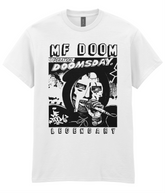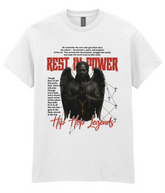HIP HOP SHOWDOWN: Redman’s Muddy Waters vs. Method Man’s Tical
HIP HOP SHOWDOWN: Redman’s Muddy Waters vs. Method Man’s Tical
Few duos in hip hop are as iconic as Redman and Method Man, two emcees whose unique styles, humor, and shared love of cannabis brought them together as an unstoppable force in rap. Before they united to form the legendary duo we know today, they made waves individually with their classic solo efforts: Redman’s Muddy Waters and Method Man’s Tical.
Released in 1996, Muddy Waters is often hailed as Redman’s magnum opus. Packed with gritty beats and razor-sharp wordplay, it cemented his place as one of the most creative voices in hip hop. On the other hand, Method Man’s Tical, released in 1994 as the first solo album from any Wu-Tang Clan member, showcased his signature raspy delivery and dark, atmospheric production.
Both albums are loved for their individuality and timeless impact. Let’s break them down to see how these classics stack up.

Production
Muddy Waters features Redman in his element, with much of the production handled by himself and his longtime collaborator, Erick Sermon of EPMD. The album has a funky, muddy, and raw soundscape that matches its title perfectly. Sermon’s trademark use of thick basslines and groovy, atmospheric samples gives the album its classic boom-bap feel, while Redman’s input ensures an unpredictable, off-the-wall energy. Tracks like “Smoke Buddah” and “Pick It Up” embody the album’s laid-back, funky vibe, while “Whateva Man” takes a smoother approach without losing its edge.
Tical is a dark, brooding masterpiece crafted almost entirely by RZA, who was at the height of his production powers. The beats on Tical carry the signature early Wu-Tang sound: murky, atmospheric, and almost cinematic in their intensity. Tracks like “Bring the Pain” and “Meth vs. Chef” are driven by gritty, stripped-down beats that perfectly complement Method Man’s smoky, charismatic flow. RZA’s use of eerie samples and sparse arrangements creates an otherworldly vibe, giving the album a unique identity within the Wu-Tang catalog.
Summary:
Muddy Waters shines with funk-infused, boom-bap production, delivering a gritty yet fun vibe courtesy of Redman and Erick Sermon, while Tical stands out for its haunting, minimalist soundscapes shaped by RZA’s signature touch, making it a dark and immersive listening experience.
Features
Muddy Waters is a showcase of Redman’s undeniable talent but doesn’t skimp on features. It includes strong appearances from fellow Def Squad members like Erick Sermon and Keith Murray, whose chemistry with Redman amplifies the album’s energy. Tracks like “Do What Ya Feel” (featuring Method Man) hint at the duo’s future greatness, as their seamless back-and-forth flows create one of the album’s highlights. The album also features K-Solo on “My Brother My Ace,” a rugged track that adds even more lyrical weight to the project. The features are carefully chosen, complementing Redman’s unpredictable and dynamic style without overshadowing him.
Tical, while heavily focused on Method Man’s solo prowess, still brings in some key Wu-Tang Clan members to add depth to the project. Raekwon delivers a sharp verse on “Meth vs. Chef,” bringing a competitive edge to the track, while Carlton Fisk provides an underrated contribution on “P.L.O. Style,” giving the track an additional layer of raw energy. RZA and Inspectah Deck also make smaller contributions that enhance the album’s cohesiveness. The features are sparingly used, ensuring that Method Man’s debut remains centered on him while showcasing the camaraderie and unity of the Wu-Tang collective.
Summary:
Muddy Waters benefits from Redman’s Def Squad family, his chemistry with Method Man, and a standout verse from K-Solo, while Tical keeps its guest list small and focused, with standout contributions from Raekwon and Carlton Fisk, maintaining a balance between individuality and Wu-Tang’s signature camaraderie.

Lyrical Content
Muddy Waters highlights Redman’s unique approach to lyricism, blending humor, punchlines, and off-kilter storytelling. His rhymes are packed with wild metaphors and unpredictable flows, showcasing his playful yet razor-sharp wit. Tracks like “Pick It Up” and “Rock Da Spot” display his ability to seamlessly switch between braggadocio and abstract imagery, keeping listeners engaged. Lyrically, Redman takes a more freewheeling, fun approach, but there’s no doubt about his technical skills and creative delivery, making Muddy Waters a standout in his discography.
Tical, in contrast, leans into Method Man’s smooth, hypnotic delivery and gritty lyricism. His verses are filled with vivid imagery, dark themes, and clever wordplay. Songs like “Bring the Pain” and “What the Blood Clot” show Method Man at his most menacing, while “Release Yo’ Delf” reflects his ability to create anthems with universal appeal. The album’s lyrical content reflects the murky, atmospheric vibe of its production, with Method Man painting a world that’s both rugged and introspective.
Summary:
Muddy Waters delivers a masterclass in creative, punchline-heavy lyricism with Redman’s signature humor and versatility, while Tical showcases Method Man’s dark, smooth delivery and vivid storytelling, creating a deeply immersive lyrical experience.
Standout Tracks
Muddy Waters boasts timeless tracks that highlight Redman’s creativity and versatility. “Whateva Man” (featuring Erick Sermon) is a laid-back anthem with a funk-infused beat that became a fan favorite. “My Brother My Ace” is a collaboration with K-Solo that blends rugged lyricism with their shared history. “Creepin’” is a darkside lyrical masterpiece with Redman going in hard over an eerie beat, while “Do What Ya Feel” (featuring Method Man) showcases their undeniable chemistry and mutual brilliance.
Tical is home to several Method Man classics. “Bring the Pain” is an instant anthem with dark production and hypnotic delivery. “Sub Crazy” is a hardcore banger with Method Man spitting relentless rhymes over a sinister beat. “What the Blood Clot” highlights his raw energy and lyrical prowess, further cementing his status as a Wu-Tang standout.
Summary:
Muddy Waters balances funky anthems, hardcore lyricism, and dynamic collaborations, while Tical delivers gritty, hard-hitting classics with unmatched intensity.
Covers & Artwork
Muddy Waters features an iconic cover that perfectly matches its raw and gritty sound. The artwork depicts Redman in a swamp-like setting, surrounded by eerie, murky waters. The color palette, dominated by greens and browns, adds to the album’s earthy, underground vibe.

Tical takes a minimalist yet striking approach with its cover. The black-and-white image of Method Man’s face partially obscured in shadows reflects the album’s dark and mysterious tone. The simplicity of the design, paired with bold use of negative space, mirrors the stripped-down, atmospheric production and Method Man’s enigmatic persona.

Summary:
The Muddy Waters cover immerses fans in its muddy, raw aesthetic with a detailed and thematic design, while Tical uses minimalism and shadowy imagery to perfectly embody its dark, atmospheric vibe and Method Man’s mystique.
Final Summary
Muddy Waters and Tical are two iconic albums that showcase the unique talents of Redman and Method Man, two emcees who would later form one of hip hop’s most celebrated duos.
Redman’s Muddy Waters is a masterclass in funk-infused production, witty lyricism, and unfiltered creativity, cementing its status as his magnum opus. On the other hand, Method Man’s Tical highlights his hypnotic flow, vivid storytelling, and RZA’s masterful production, creating a deeply immersive experience.
Both albums are brilliant reflections of their respective artists. The question remains: which resonates with you more? Is it the funky, wild energy of Muddy Waters, or the dark, hypnotic tones of Tical? The decision is yours.





